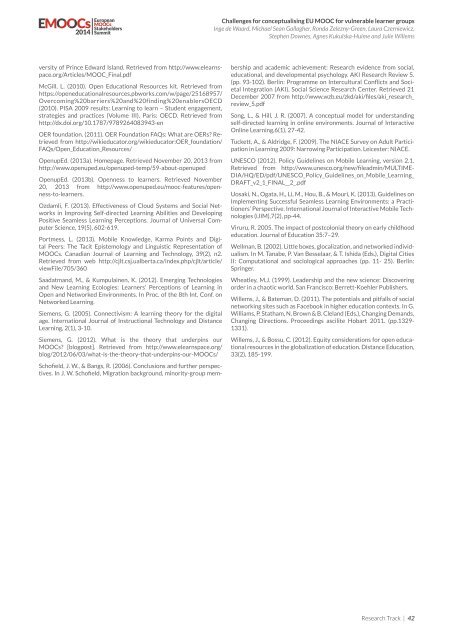zmWmQs
zmWmQs
zmWmQs
Create successful ePaper yourself
Turn your PDF publications into a flip-book with our unique Google optimized e-Paper software.
Challenges for conceptualising EU MOOC for vulnerable learner groups<br />
Inge de Waard, Michael Sean Gallagher, Ronda Zelezny-Green, Laura Czerniewicz,<br />
Stephen Downes, Agnes Kukulska-Hulme and Julie Willems<br />
versity of Prince Edward Island. Retrieved from http://www.elearnspace.org/Articles/MOOC_Final.pdf<br />
McGill, L. (2010). Open Educational Resources kit. Retrieved from<br />
https://openeducationalresources.pbworks.com/w/page/25168957/<br />
Overcoming%20barriers%20and%20finding%20enablersOECD<br />
(2010). PISA 2009 results: Learning to learn – Student engagement,<br />
strategies and practices (Volume III). Paris: OECD. Retrieved from<br />
http://dx.doi.org/10.1787/9789264083943-en<br />
OER foundation. (2011). OER Foundation FAQs: What are OERs Retrieved<br />
from http://wikieducator.org/wikieducator:OER_foundation/<br />
FAQs/Open_Education_Resources/<br />
OpenupEd. (2013a). Homepage. Retrieved November 20, 2013 from<br />
http://www.openuped.eu/openuped-temp/59-about-openuped<br />
OpenupEd. (2013b). Openness to learners. Retrieved November<br />
20, 2013 from http://www.openuped.eu/mooc-features/openness-to-learners.<br />
Ozdamli, F. (2013). Effectiveness of Cloud Systems and Social Networks<br />
in Improving Self-directed Learning Abilities and Developing<br />
Positive Seamless Learning Perceptions. Journal of Universal Computer<br />
Science, 19(5), 602-619.<br />
Portmess, L. (2013). Mobile Knowledge, Karma Points and Digital<br />
Peers: The Tacit Epistemology and Linguistic Representation of<br />
MOOCs. Canadian Journal of Learning and Technology, 39(2), n2.<br />
Retrieved from web http://cjlt.csj.ualberta.ca/index.php/cjlt/article/<br />
viewFile/705/360<br />
Saadatmand, M., & Kumpulainen, K. (2012). Emerging Technologies<br />
and New Learning Ecologies: Learners’ Perceptions of Learning in<br />
Open and Networked Environments. In Proc. of the 8th Int. Conf. on<br />
Networked Learning.<br />
Siemens, G. (2005). Connectivism: A learning theory for the digital<br />
age. International Journal of Instructional Technology and Distance<br />
Learning, 2(1), 3-10.<br />
Siemens, G. (2012). What is the theory that underpins our<br />
MOOCs [blogpost]. Retrieved from http://www.elearnspace.org/<br />
blog/2012/06/03/what-is-the-theory-that-underpins-our-MOOCs/<br />
Schofield, J. W., & Bangs, R. (2006). Conclusions and further perspectives.<br />
In J. W. Schofield, Migration background, minority-group membership<br />
and academic achievement: Research evidence from social,<br />
educational, and developmental psychology. AKI Research Review 5.<br />
(pp. 93-102). Berlin: Programme on Intercultural Conflicts and Societal<br />
Integration (AKI), Social Science Research Center. Retrieved 21<br />
December 2007 from http://www.wzb.eu/zkd/aki/files/aki_research_<br />
review_5.pdf<br />
Song, L., & Hill, J. R. (2007). A conceptual model for understanding<br />
self-directed learning in online environments. Journal of Interactive<br />
Online Learning,6(1), 27-42.<br />
Tuckett, A., & Aldridge, F. (2009). The NIACE Survey on Adult Participation<br />
in Learning 2009: Narrowing Participation. Leicester: NIACE.<br />
UNESCO (2012). Policy Guidelines on Mobile Learning, version 2.1.<br />
Retrieved from http://www.unesco.org/new/fileadmin/MULTIME-<br />
DIA/HQ/ED/pdf/UNESCO_Policy_Guidelines_on_Mobile_Learning_<br />
DRAFT_v2_1_FINAL__2_.pdf<br />
Uosaki, N., Ogata, H., Li, M., Hou, B., & Mouri, K. (2013). Guidelines on<br />
Implementing Successful Seamless Learning Environments: a Practitioners’<br />
Perspective. International Journal of Interactive Mobile Technologies<br />
(iJIM),7(2), pp-44.<br />
Viruru, R. 2005. The impact of postcolonial theory on early childhood<br />
education. Journal of Education 35:7–29.<br />
Wellman, B. (2002). Little boxes, glocalization, and networked individualism.<br />
In M. Tanabe, P. Van Besselaar, & T. Ishida (Eds.), Digital Cities<br />
II: Computational and sociological approaches (pp. 11- 25). Berlin:<br />
Springer.<br />
Wheatley, M.J. (1999). Leadership and the new science: Discovering<br />
order in a chaotic world. San Francisco: Berrett-Koehler Publishers.<br />
Willems, J., & Bateman, D. (2011). The potentials and pitfalls of social<br />
networking sites such as Facebook in higher education contexts. In G.<br />
Williams, P. Statham, N. Brown & B. Cleland (Eds.), Changing Demands,<br />
Changing Directions. Proceedings ascilite Hobart 2011. (pp.1329-<br />
1331).<br />
Willems, J., & Bossu, C. (2012). Equity considerations for open educational<br />
resources in the globalization of education. Distance Education,<br />
33(2), 185-199.<br />
Research Track | 42


